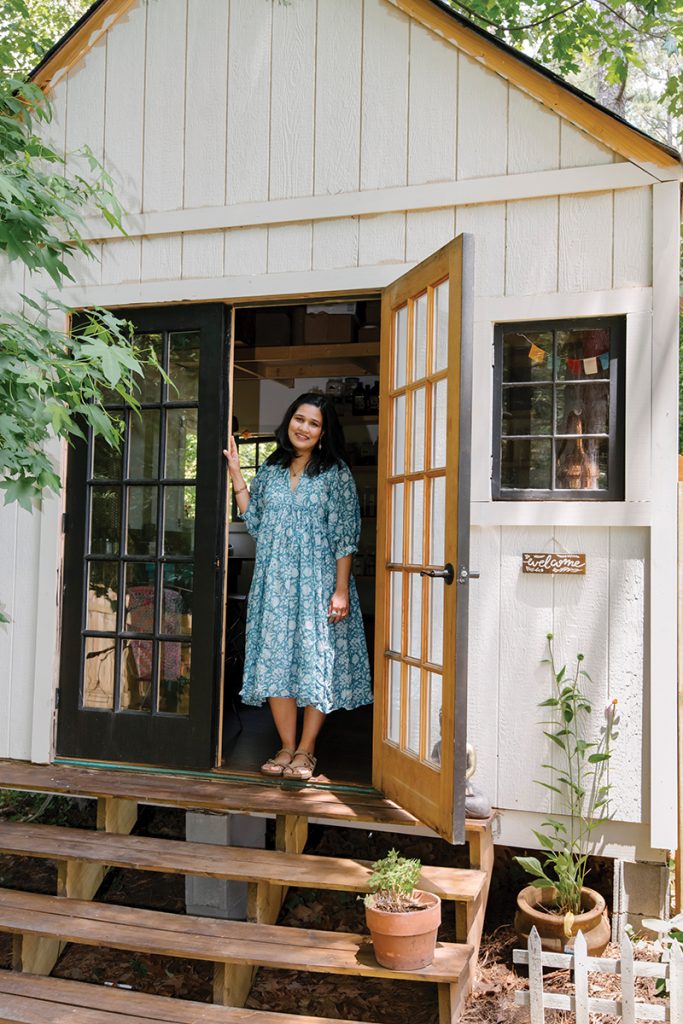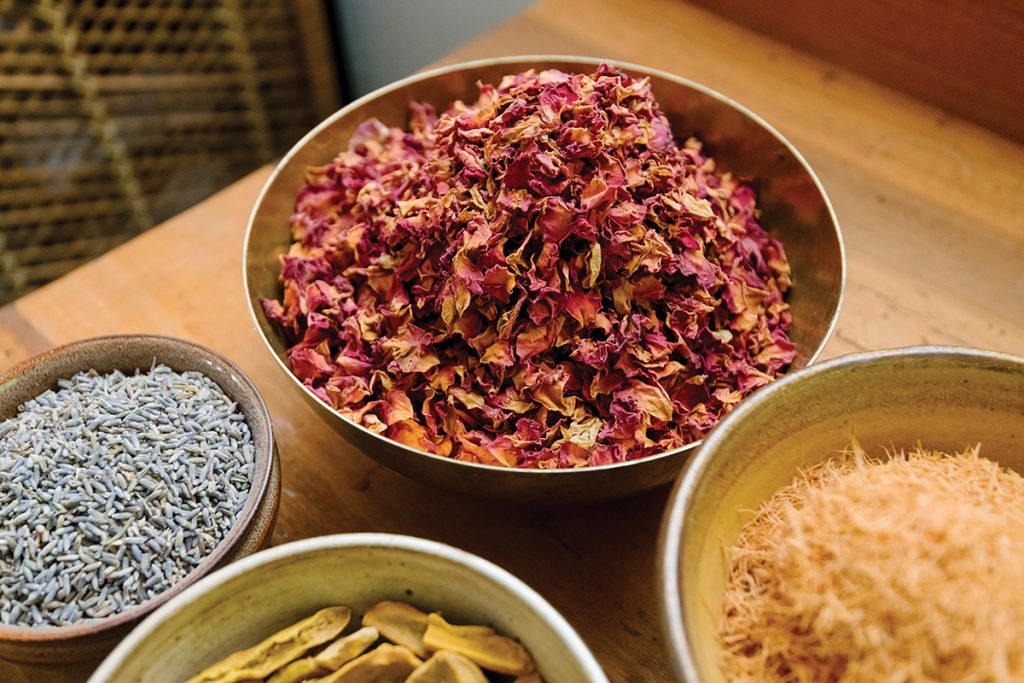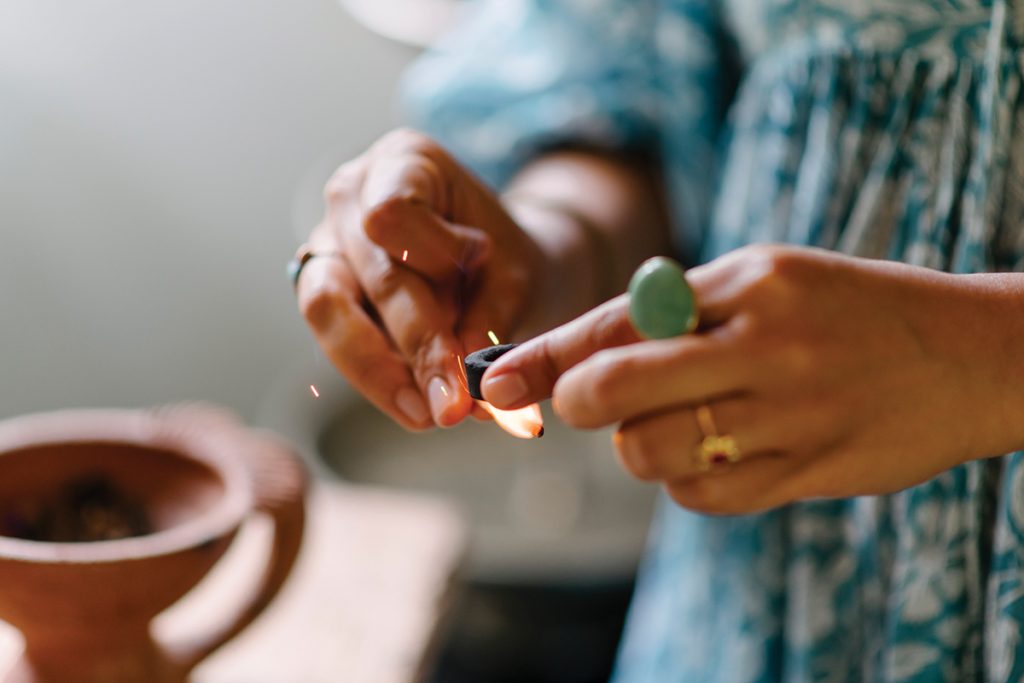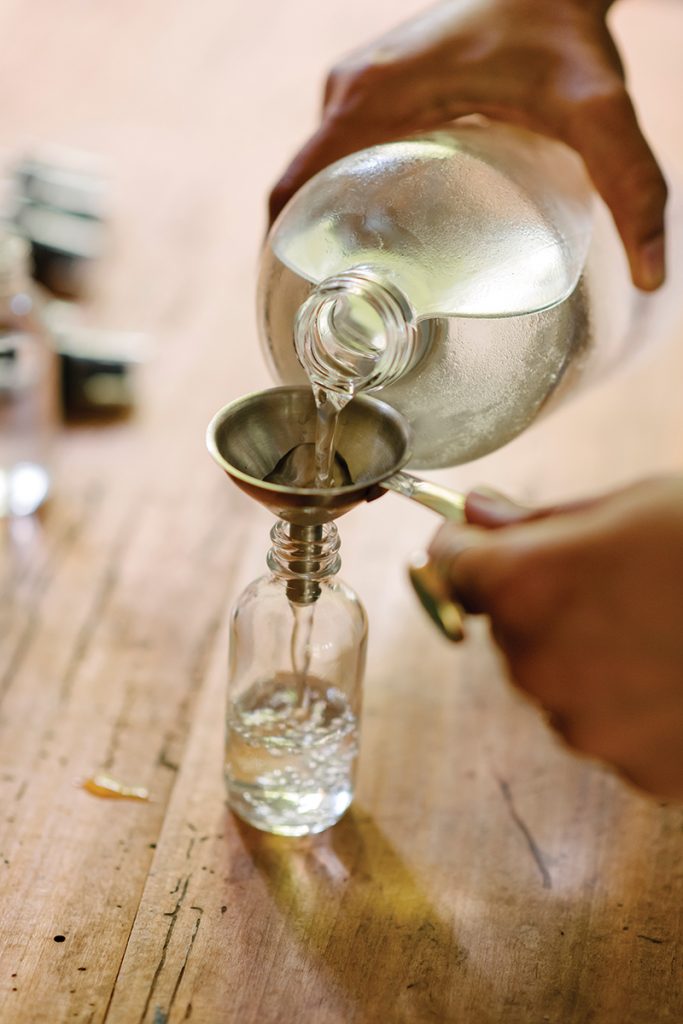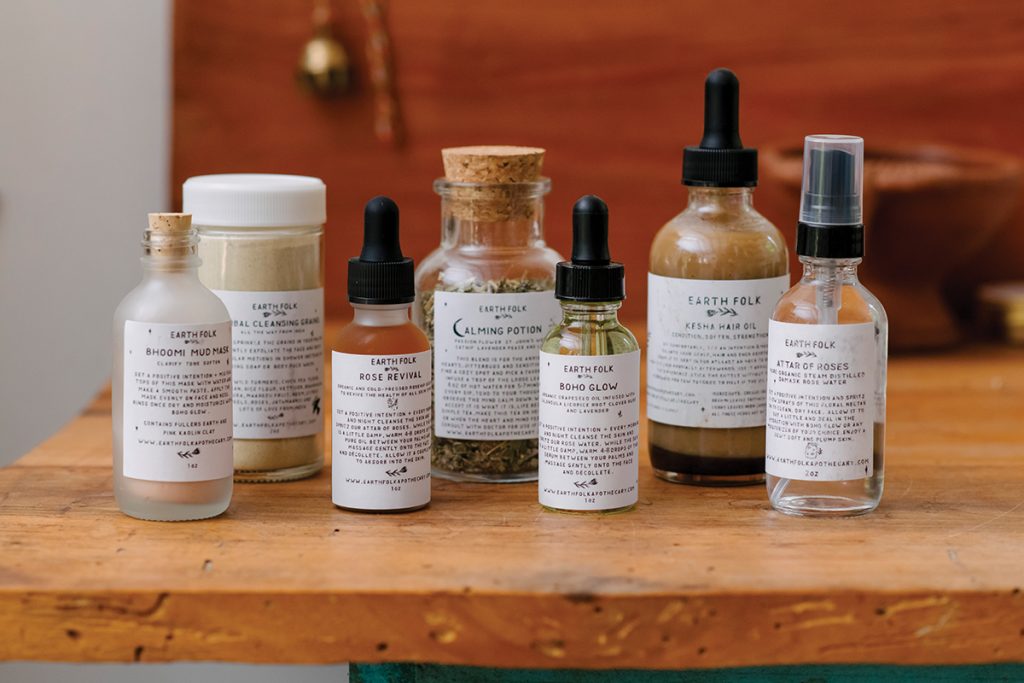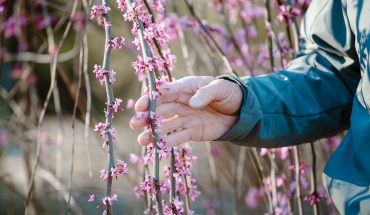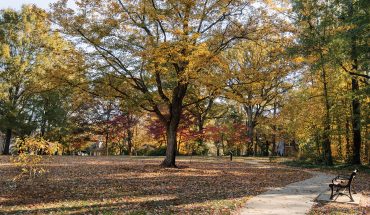Sri Lankipalli keeps her South Indian traditions alive with herbal remedies she makes by hand in her West Raleigh studio.
by Addie Ladner | photography by Liz Condo
A one-room wooden studio sits in the pine-filled backyard of Sri Lankipalli’s West Raleigh home. Here, floor-to-ceiling shelves hold vessels filled with dried rosebuds, hibiscus blossoms, wild turmeric and burdock root. A copper distiller sits on a counter; frankincense burns on an antique table. Light streams in from French doors and a brass Tibetan bell hangs on the wall.
In this space Lankipalli pays homage to her homeland in Southern India and the generations that came before her. When she was a child in the hillside town of Chittoor, her mother would rub a chalky clay native to the area on her belly when she had a stomach ache.
Her grandmother would give her a spoonful of honey with black pepper to ease a sore throat. “I always felt better after these rituals. In India, we have a remedy for everything,” she laughs. Among them: ginger for nausea, peppermint for bloating, cumin for constipation, camphor for dry scalp.
Such is the inspiration for Earth Folk Apothecary, a curated range of skincare products and teas that Lankipalli makes by hand. “My main focus is the very basics of skincare: cleansing, toning, moisturizing and masking. In my opinion, that’s all you need,” Lankipalli says.
It’s all rooted in Ayurvedic techniques, an ancient form of holistic medicine and living centered around mindfulness, nature and viewing the body as an interconnected whole.
The Cleansing Grains is a gentle dry powder cleanser made from chickpea and rice flour with rose petals, turmeric and citrus. The Calming Potion is a tea of dried botanicals like lavender, St. John’s Wort and passion flowers. The Kesha Hair Oil combines ingredients like neem, curry leaves, eucalyptus, camphor, rose and lemongrass, all shipped to Lankipalli from her family back home.
Some of the items in her product range blend Western beauty rituals with Indian ingredients. The makeup remover, for example, is a product not often seen in India. “We don’t really wear makeup back home. When I started using lipstick when I first moved here in 2013, I posted a photo online and my mom freaked out! We believe you should embrace your imperfections and unique beauty,” she says. “But I try to blend my heritage with the culture here.”
To that end, the Cleansing Balm, a makeup remover, is made with calendula flowers, wild roses, shea butter and olive oil. Lankipalli melts the oils and butter together, steeps the liquid in the botanicals and lets it sit in a dark corner for four to six weeks, shaking it every so often.
To get its thick, creamy consistency, she alternates whipping it by hand and refrigerating it over and over. “It inserts air into the butters, which helps it permeate into the layers of skin. Hand whipping, although arduous, produces a very rewarding texture,” she says.
She’s also enjoyed scouring the local markets for ingredients native to North Carolina. “I want to get more into biology and understand what’s native. Not everything that comes from India is beneficial to people who were born and raised here,” she says.
“You need something that’s native to you.” She sources beeswax from local apiary Fruchtenicht Honey at the Durham Farmers’ Market and calendula from Cedar Grove-based herb grower Maple Spring Gardens. She also uses cedar bark from her backyard and “sometimes from my neighbor, who is kind enough to let me harvest from her gorgeous tree.”
While herbal remedies were always a part of her life, it was in eighth grade that the interest and awareness of her culture’s Ayurvedic practices took a stronger hold. Her parents, both knee-deep in their careers, worried she wasn’t getting the attention she needed and sent her to live with her grandparents for a year in a small village on the banks of the Krishna River.
Her grandfather worked on nearby farms every day and her grandmother had a vibrant garden known for its fragrant roses. It was brimming with native plants like hibiscus and jasmine, as well as guava, neem, sapota and pomegranate trees that she tended to for hours every day.
“It was a paradise of plants,” she recalls. “Neighbors and villagers would come to her home every day after she had harvested enough for her prayers and rituals, and she would happily let them pick what they wanted.”
Tomatoes, okra, basil, eggplant and other edibles supplied their kitchen. “I think that’s where this entire thing started,” she says. “Their needs were basic and their purpose was to be stewards to the land they were passed down. They were the Earth Folk to me. The original Earth Folk in my life.”
Lankipalli would sit for hours watching her grandmother make a version of many of the remedies she makes today: “Some days I’d be intrigued to learn and some days it was just because there was nothing else to do.”
Once a month, her grandmother would harvest the neem, hibiscus, gooseberries, brahmi and bhringraj herbs, curry leaves and coconut oil from her grove and simmer them on a wood-fired stove to make hair oil. “My job was to occasionally go and stir the oil so the herbs did not settle at the bottom and burn,” she remembers.
“She’d then let it cool and strain with an old soft cotton sari, squeeze out the oil and bottle them.” When she didn’t feel like exploring the garden or helping her grandmother, she’d tag along with her grandfather and uncle on the back of a bullock cart.
“I watched both of them tend to the land in their own way with so much reverence and love,” she says. “There’s no way I’d ever know the names of any of the herbs that go into our natural bath and body products if it wasn’t for my year of that unasked apprenticeship with them.”
Lankipalli moved to the States in 2013 at 23 to get her master’s in information systems at Eastern Michigan University. But she kept hold of her family’s recipes for basic skin care. “It was a part of our everyday life, a normal thing,” she says, but out of a need to adjust to colder, dryer temperatures, she had to go a little deeper. “It was so cold.
I needed something that would clean my face but not strip the natural oils,” she says. She tested a few different things, then started sharing them with friends and colleagues.
“I started selling them with encouragement from my friends; they loved my products and wanted to pay for them since they knew how expensive it was for my parents to ship me the ingredients,” she says. As first-time customers became repeats, Lankipalli started selling at markets and online, and Earth Folk was created in 2016.
“New customers are wonderful but it feels special when someone comes back because it worked,” she says.
Karen Daidone, a Raleigh resident, switched to using Earth Folk products almost exclusively nearly two years ago and said she’s seen a dramatic change in her skin since.
“My skin is somewhat oily and I have been prone to breakouts my entire life but these products have made such an improvement in my complexion. I can’t say enough good things about Earth Folk,” says Daidone. “I use the Cleansing Grains to exfoliate, Rose Water spray and Bojo Oil to moisturize in the morning. And the Cleansing Balm to remove makeup and Nila to moisturize before bed.”
Lankipalli and her husband moved to Raleigh in 2020, and she took a job at North Carolina State University as a business analyst. That year, they bought a house here and built the apothecary, which now drives a small but steady business.
She opens her backyard studio twice a year, around the holidays and in the summer, and sells at markets in the Triangle.
People can also order from her website and make an appointment to visit the shop. But Lankipalli doesn’t have any intention of it becoming a full-time job. Instead, it’s a meditative, creative outlet for her. “I love being able to use my hands and doing things like designing the labels,” she says. “It’s a nice balance to my day job.”
And it’s an education. In the evenings and on the weekends, she’s usually delving into a stack of books on herbalism, Ayurvedic medicine and biology. “One day I’d love to learn how to make perfumes with hydrosols.
I’m currently reading Braiding the Sweet Grass, Gaia’s Garden and Kitchen Garden Revival to help me plan a backyard garden where I can grow most of my own herbs for the apothecary,” she says.
But there’s a fundamental reason for keeping these ancient skincare rituals alive: “I cling to this because I am away from home,” she says. “As I grow older and farther from my family, memories become precious treasures. Those mundane days of my childhood have guided me toward a life I didn’t realize I had fallen in love with.”
This article originally appeared in the December 2023 issue of WALTER magazine.

